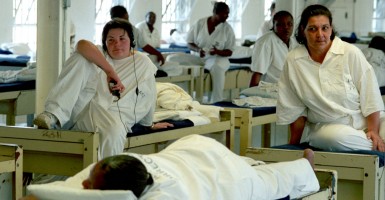Piper Kerman, whose memoir about her year in a federal women’s prison—titled “Orange Is The New Black”—was adapted into a Netflix series, testified before the Senate Tuesday to illustrate the criminal justice system’s failings in assisting female inmates.
“When I was locked up, I knew women who were trying to raise their children during brief reunions in the visitor’s room while fending off sexual harassment, struggling with addiction, and trying to get a high school education so that when they got out, they stood some chance of surviving despite their felony conviction,” she told the Senate Committee on Homeland Security and Governmental Affairs.
During Kerman’s experience behind bars in a Danbury, Conn., federal prison, women were given few resources to better themselves, she says.
She saw women denied necessary medical care, while others with mental health issues had to wait months before the one psychiatrist available for 1,400 women could advise them.
“That’s unimaginable in a system where at least 65 percent of women experience some kind of mental illness,” Kerman said.
Further, the re-entry programs meant to help women readjust to life after prison were often irrelevant or unhelpful, she said.
Kerman attended a program on housing, hoping to learn how someone with a felony conviction could find a safe and affordable place to live.
But instead, the teaching was off-topic, she says, and she learned about fiberglass insulation and roof maintenance from a man who worked construction in the prison.
The re-entry health classes, Kerman continued, were taught by a culinary department officer who had no expertise on reproductive health, mental health or substance abuse.
“He had, however, played professional baseball for a brief time and hence his authority on the health topic,” Kerman said sarcastically.

Taylor Schilling plays Piper Kerman in the Netflix adaption of “Orange is the New Black.” (Photo: Patrick McMullan Co./McMullan/Sipa USA/Newscom)
Women are the fastest growing population in the U.S. criminal justice system, with the vast majority—63 percent—serving time for a nonviolent offense usually related to drug or property crimes.
Kerman detailed in her written testimony that a higher percentage of women in the system are mentally ill, a higher number experience sexual and physical assault in prisons and jails and many are single mothers with young children.
The Federal Bureau of Prisons exacerbated difficulties for women to maintain relationships with their children in 2013 when it converted the Danbury prison into a men’s facility, transferring women to a federal prison in Alabama.
Sen. Cory Booker, D-N.J., said the slated move sends women 1,000 miles from the New York area, violating the Bureau of Prisons’ goal to keep convicts within 500 miles of their homes.
“There are a lot of people from the northeast, a lot of women with small children, who are having those connections effectively severed and that is very problematic,” he said.
Kerman urged Congress and the Bureau of Prisons to adopt gender-specific policies to address the differences between men’s and women’s experiences while incarcerated.
She cited research finding that women’s incarceration is overwhelmingly driven by substance abuse, mental illness or an experience with traumatic violence.
This last driver, Kerman said, is exacerbated in a criminal justice system, where more than 80 percent of women report emotional, physical or sexual abuse prior to incarceration.
“The problem with incarceration is that for prisoners who have experienced very significant trauma like rape, sexual abuse and domestic violence, many of the commonplace correctional practices are very reminiscent of some of those abuses,” she said. “This creates a serious, serious challenge in terms of rehabilitation and re-entry.”
Citing the drug crackdown in the 1980s that resulted in harsh mandatory sentencing, Kerman said those working in the criminal justice system need to reevaluate if many of the women should have been incarcerated in the first place.
“If any member of this committee had the opportunity to meet the hundreds of women I did time with, you would probably walk away from getting to know those women with a deep feeling that their confinement in a prison cell or a prison facility was just a colossal waste,” she said.
































